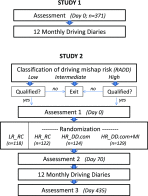Predicting and Reducing Driving Mishaps Among Drivers With Type 1 Diabetes
- PMID: 28404657
- PMCID: PMC5439415
- DOI: 10.2337/dc16-0995
Predicting and Reducing Driving Mishaps Among Drivers With Type 1 Diabetes
Abstract
Objective: Two aims of this study were to develop and validate A) a metric to identify drivers with type 1 diabetes at high risk of future driving mishaps and B) an online intervention to reduce mishaps among high-risk drivers.
Research design and methods: To achieve aim A, in study 1, 371 drivers with type 1 diabetes from three U.S. regions completed a series of established questionnaires about diabetes and driving. They recorded their driving mishaps over the next 12 months. Questionnaire items that uniquely discriminated drivers who did and did not have subsequent driving mishaps were assembled into the Risk Assessment of Diabetic Drivers (RADD) scale. In study 2, 1,737 drivers with type 1 diabetes from all 50 states completed the RADD online. Among these, 118 low-risk (LR) and 372 high-risk (HR) drivers qualified for and consented to participate in a 2-month treatment period followed by 12 monthly recordings of driving mishaps. To address aim B, HR participants were randomized to receive either routine care (RC) or the online intervention "DiabetesDriving.com" (DD.com). Half of the DD.com participants received a motivational interview (MI) at the beginning and end of the treatment period to boost participation and efficacy. All of the LR participants were assigned to RC. In both studies, the primary outcome variable was driving mishaps.
Results: Related to aim A, in study 1, the RADD demonstrated 61% sensitivity and 75% specificity. Participants in the upper third of the RADD distribution (HR), compared with those in the lower third (LR), reported 3.03 vs. 0.87 mishaps/driver/year, respectively (P < 0.001). In study 2, HR and LR participants receiving RC reported 4.3 and 1.6 mishaps/driver/year, respectively (P < 0.001). Related to aim B, in study 2, MIs did not enhance participation or efficacy, so the DD.com and DD.com + MI groups were combined. DD.com participants reported fewer hypoglycemia-related driving mishaps than HR participants receiving RC (P = 0.01), but more than LR participants receiving RC, reducing the difference between the HR and LR participants receiving RC by 63%. HR drivers differed from LR drivers at baseline across a variety of hypoglycemia and driving parameters.
Conclusions: The RADD identified higher-risk drivers, and identification seemed relatively stable across time, samples, and procedures. This 11-item questionnaire could inform patients at higher risk, and their clinicians, that they should take preventive steps to reduce driving mishaps, which was accomplished in aim B using DD.com.
Trial registration: ClinicalTrials.gov NCT01563887.
© 2017 by the American Diabetes Association.
Figures
References
-
- World Health Organization Global Status Report on Road Safety 2013: Supporting a Decade of Action. Geneva, World Health Organization, 2013
-
- National Highway Traffic Safety Administration. 2015 Motor vehicle crashes: overview. Traffic safety facts research note, August 2016 [article online]. Available from https://crashstats.nhtsa.dot.gov/Api/Public/ViewPublication/812318. Accessed 28 March 2017
-
- Cox DJ, Penberthy JK, Zrebiec J, et al. Diabetes and driving mishaps: frequency and correlations from a multinational survey. Diabetes Care 2003;26:2329–2334 - PubMed
-
- Gonder-Frederick LA, Cox DJ, Driesen NR, Ryan CM, Clarke WL. Individual differences in neurobehavioral disruption during mild and moderate hypoglycemia in adults with IDDM. Diabetes 1994;43:1407–1412 - PubMed
-
- Stork AD, van Haeften TW, Veneman TF. Diabetes and driving: desired data, research methods and their pitfalls, current knowledge, and future research. Diabetes Care 2006;29:1942–1949 - PubMed
Publication types
MeSH terms
Substances
Associated data
LinkOut - more resources
Full Text Sources
Other Literature Sources
Medical




